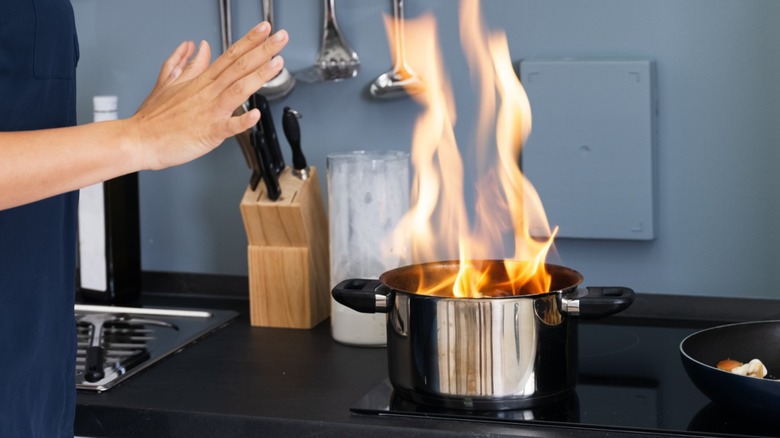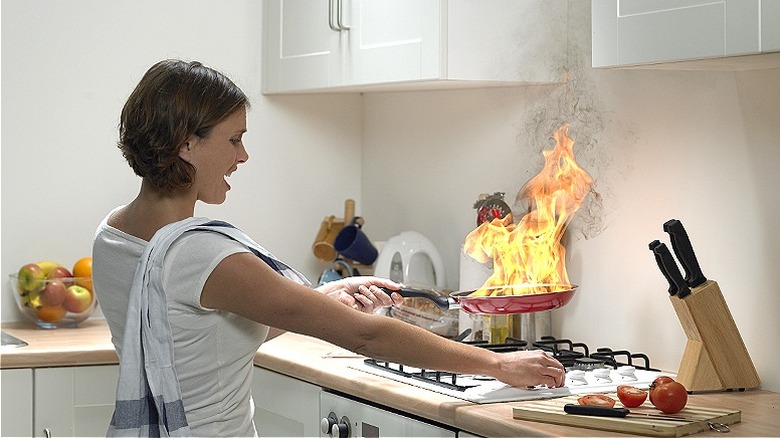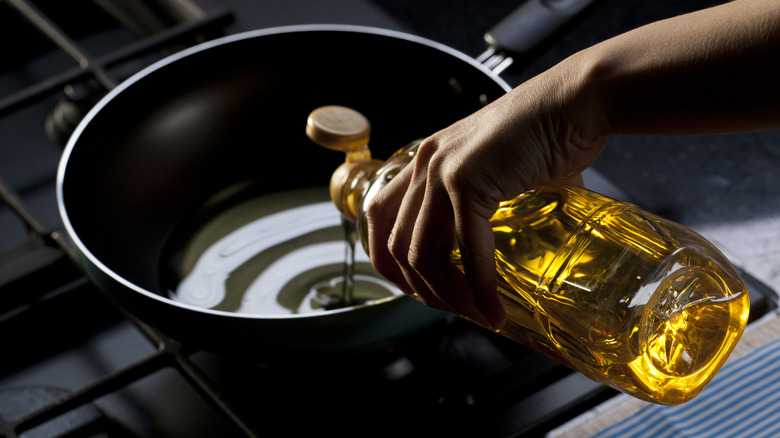How To Put Out A Small Grease Fire With A Handy Kitchen Staple
Fires that start during cooking make up 49% of reported household fires in the United States, according to the National Fire Protection Association. Of kitchen fires, grease fires can be particularly dangerous, as they happen quickly and can spread easily. Knowing how to be prepared if a fire were to break out while you're making dinner is an important step to keeping you and your family safe. If the fire is small, you may be able to put it out with an ingredient that's likely already in your pantry: baking soda.
Baking soda works well for putting out grease fires that are still contained in the pot or pan. It's best to dump as much baking soda as you can directly over the fire, as pouring it from the side can cause the flames to flick backward and spread to other parts of the kitchen.
When a grease fire occurs, the best way to put it out is to deprive it of oxygen. If you can reach the knobs on your stove, turn off the burner and cover the pan in baking soda; baking soda creates carbon dioxide when it touches flames and will suffocate the fire. This may not put the fire completely out, however, but putting a metal lid or baking sheet over the flames will help to smother it. Call emergency services and make sure everyone in the home goes outdoors if the fire spreads to the stovetop or other parts of the kitchen.
Grease fire safety measures beyond baking soda
Dealing with a kitchen fire is terrifying, but if that fire is caused by hot grease, it's crucial to avoid certain extinguishing methods. Water will worsen grease fires because the vaporization of the liquid will cause flames to spread, so it's important to never pour water or other liquids into a pan with oil. While baking soda and salt will sometimes help to lessen or put out a small grease fire, other similar kitchen ingredients will worsen it. Sugar, flour, and baking powder are combustible, and could create explosions.
Using a towel, whether it's dry or damp, to try to smother the flames might spread it. The best course of action is to cover the pan with a lid. Make sure to use a metal lid or cookie sheet, as glass or ceramic could shatter.
Further, while Class K and B fire extinguishers will put out grease fires, other types could increase the flames. Extinguishers also contain many chemicals that will spread throughout the room, so they should not be your first plan of action. If the fire becomes too large or you can't get near it to put it out, call 911 immediately and leave the house. For kitchens that are separated from the rest of the home by a door, closing it behind you as you leave can help prevent the flames from spreading to other rooms.
How to prevent grease fires
If you're planning to pan-fry food on your stove, it's crucial not to leave the heating oil, as grease fires can happen suddenly — even walking away for a moment to grab something can be detrimental. Rather than rushing to heat your oil, make sure to do it slowly, watching for signs of smoke. Various oils will smoke at different temperatures, so it's important to take into account what type of oil you're using and consider checking the temperature with a thermometer. If the grease begins to smoke, turn down the heat and watch it closely.
When you add your food to the pan, slowly lower it into the oil to avoid splashes. It's a good idea to avoid putting frozen food into oil altogether since any frozen liquid could start a fire (via evaporation and steam). These methods will help prevent grease fires in your home, but if one does break out, reach for your baking soda.


